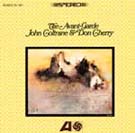
http://www.kindamuzik.net
ernaast
Onze laatste liverecensie.
Onze laatste albumrecensie.
Ons laatste interview.
Onze laatste video.
John Coltrane | The Avant-Garde
Coltrane's first steps into freejazz are not very stable, but still good enough.
CD, Atlantic Jazz
Tekst: Bas Ickenroth
Publicatiedatum: 07 maart 2001

Two old Coltrane records, just recently re-issued. Is this necessary, you ask? Yes, people, these recordings are absolutely essential. Essential for everyone who wants their music way out of the mainstream. Essential for everyone who wants their music on the proverbial edge. 'Olé Coltrane' and 'The Avant-Garde' provide essential material for anyone who wants to know what jazz is all about, but doesn't want it too smooth or mellow. On 'The Avant-Garde' from 1960 John Coltrane collaborates with Don Cherry, jazz trumpeter extra-ordinaire (and father of Eagle-Eye and Neneh, but don't hold that against him) on the first recordings for Coltrane exploring the free-jazz area. Cherry, obviously more experienced with this kind of jazz at that time, is mostly leading the way in the somewhat estranging melodies of the songs - which are mostly written by free-jazz originator Ornette Coleman (next to Sun Ra, that is) - and Coltrane tries to keep up with him. Most of the time he succeeds in doing so, but the unfamiliarity with the free-form solo explorations can sometimes be heard. The reason 'The Avant-Garde' still is essential lies in the fact that Coltrane plays the soprano saxophone for the first time on these studiorecordings, and you are always able to hear the enormous talent of the man in every note that comes out his instrument. On 'Olé Coltrane' John Coltrane obviously is more in his element. Where on 'The Avant-Garde' he worked with people like Charlie Haden and Ed Blackwell - great musicians but not long time Coltrane collaborators - on 'Olé Coltrane' he worked Elvin Jones, McCoy Tyner and Eric Dolphy, people who worked with him before and would work with for years after this record. Talking about essential, the word seems to be invented for records like this. Coltrane experiments here with larger bands (two saxophones, two bassplayers, a drummer, a trumpeter and pianist) than the standard jazz ensemble. The hypnotising titletrack provides it all in its entire 18 minutes: A Spanish spiced melody that keeps coming back, two bassists soloing against eachother, Coltrane with two of his best solos ever (the second is just completely out this world), the piano as the foundation, Eric Dolphy with a beautiful flute part, and Elvin Jones on the drums setting the standards for polyrhythmic drumming again a few yards higher. Music doesn't get any better than this, in my not so humble opinion. The other three songs don't reach that high level, but that would have been impossible anyway: such an outburst of creative energy doesn't emerge everyday. A couple of years later artists like Carlos Santana would admit that he admired Coltrane enormously and that his music wouldn't be the same without him. Hearing this record immediately makes you believe Santana. To conclude, these are not pure free-jazz records. There are still enough elements here from the more traditional forms of jazz, but the first steps towards classic Coltrane free-jazz records like 'Ascension' and 'Interstellar Space' (and Eric Dolphy's 'Out to Lunch' too, for that matter) are made here. Go get them. These are essentials.
http://www.kindamuzik.net/recensie/john-coltrane/the-avant-garde/150/
Meer John Coltrane op KindaMuzik: http://www.kindamuzik.net/artiest/john-coltrane
Vind je John Coltrane goed? Lees dan ook bij KindaMuzik over:
» Teeth Of Lions Rule The Divine» Miles Davis
» Herbie Hancock








Deel dit artikel: